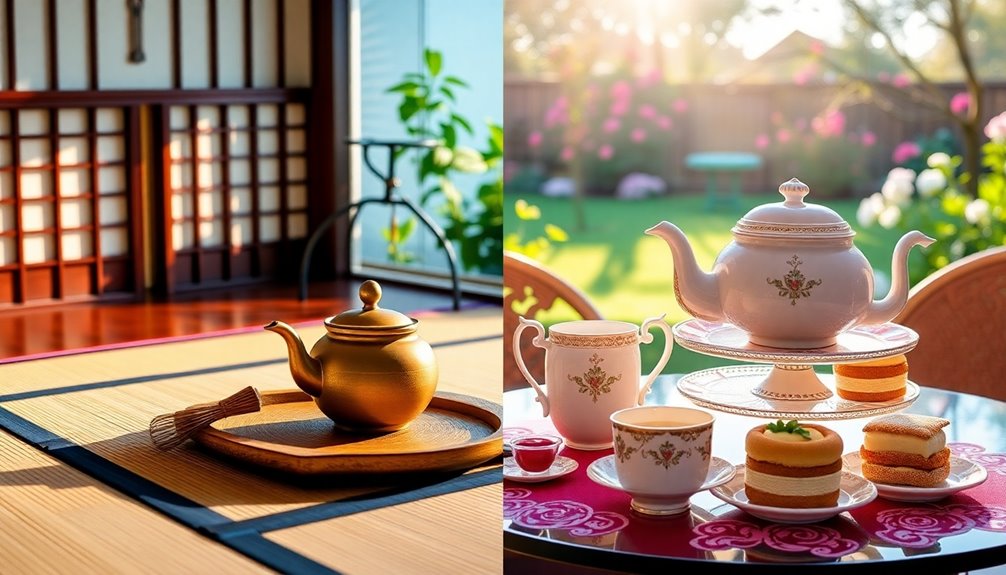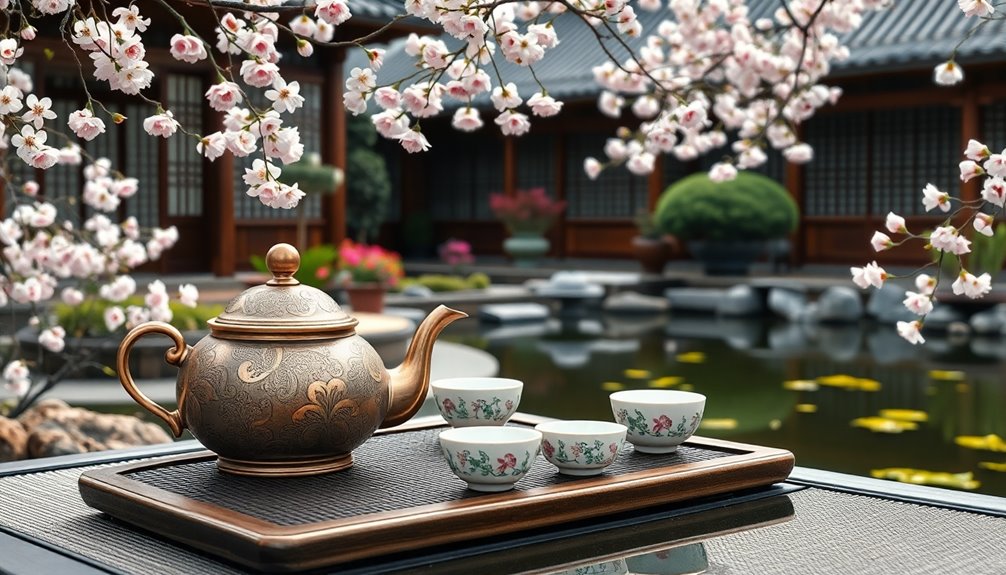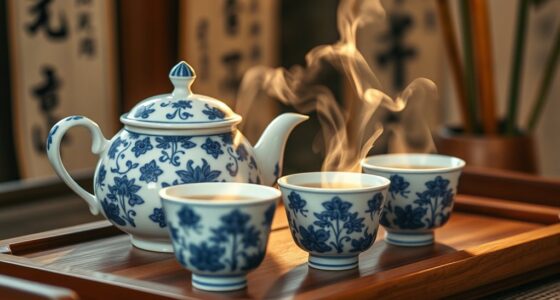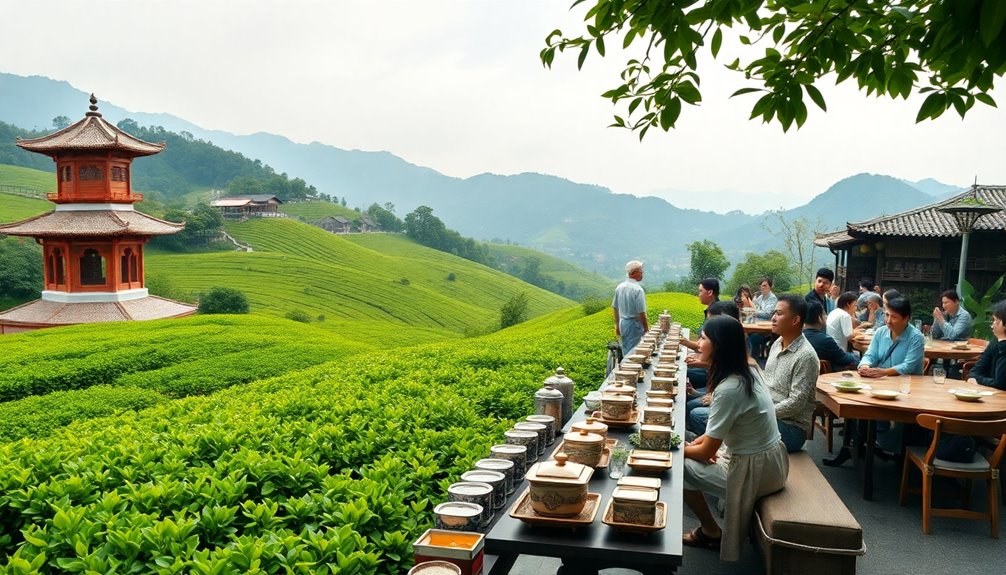Different countries celebrate tea in exciting ways! In Turkey, people enjoy the highest tea consumption in the world, sipping it throughout the day. China has the Gongfu tea ceremony, emphasizing skilled brewing techniques. Japan hosts Chado, focusing on harmony while preparing matcha. In India, chai represents hospitality, with different spices making each cup special. Morocco's mint tea, poured with flair, fosters friendship and lively chats. Meanwhile, British afternoon tea combines delicious snacks with a casual social atmosphere. Each tradition highlights tea as a way to connect and cherish moments together. There's so much more to discover about these delightful customs!
Key Takeaways
- China celebrates tea through the Gongfu tea ceremony, emphasizing precision and skill in brewing high-quality teas.
- Japan's Chado focuses on harmony and tranquility, particularly in the preparation of matcha.
- In India, chai culture fosters hospitality, with diverse regional recipes shared among friends and family.
- Moroccan tea rituals involve ceremonial pouring techniques, symbolizing friendship and encouraging vibrant conversation.
- The British tradition of afternoon tea combines tea with light snacks, creating a cherished social event for relaxation and connection.
Introduction
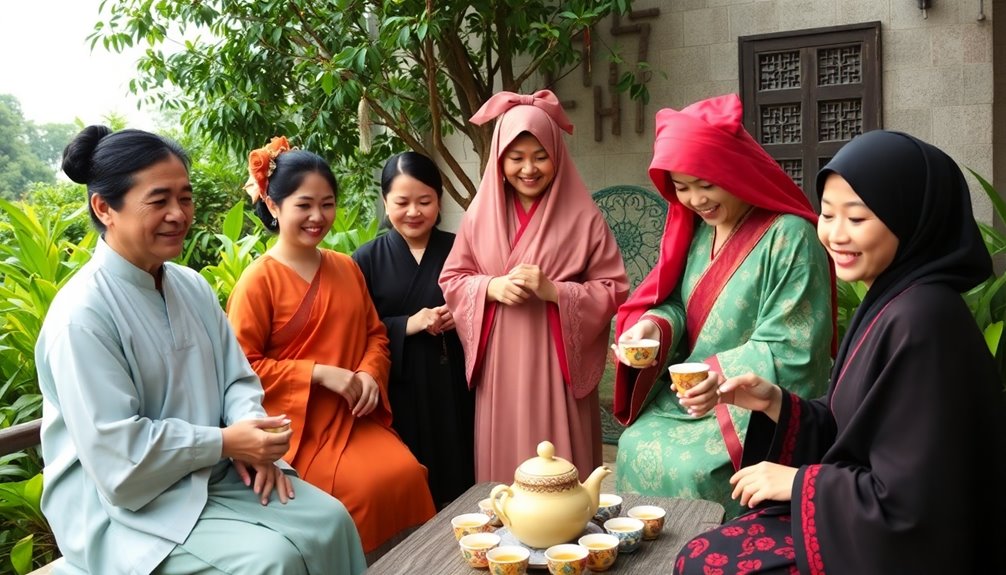
Tea is more than just a beverage; it's a global celebration that brings people together. With each sip, you experience unique tea rituals and customs that reflect the heart of different cultures. From the moment you start drinking tea, you enter a world where every country has its own special way to enjoy this delightful drink.
In China, the Gongfu tea ceremony emphasizes careful brewing techniques, turning each cup into a moment of mindfulness and friendship.
When you participate in Japan's Chado, you'll notice how intricate gestures and seasonal themes create a serene atmosphere, promoting harmony among everyone involved.
Meanwhile, India's chai culture invites you to enjoy spiced black tea, symbolizing warmth and community, especially when chai wallahs serve up their unique recipes.
And don't forget about Moroccan mint tea rituals, where the preparation and pouring techniques create a frothy top, encouraging social interaction and joy among guests.
No matter where you're in the world, the art of drinking tea not only quenches your thirst but also builds connections, making every cup a celebration of culture and friendship.
Global Tea Consumption Patterns
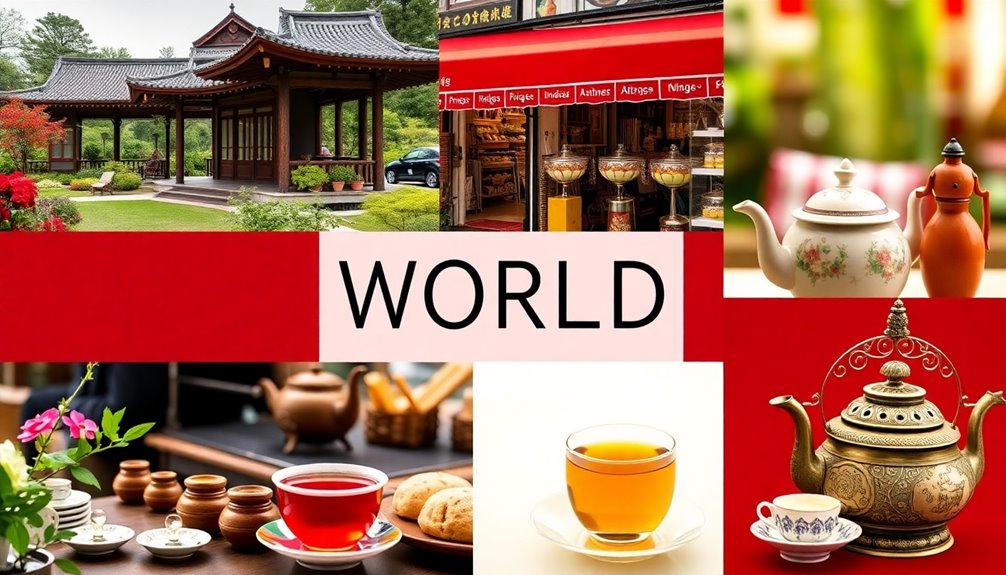
Understanding how tea is enjoyed globally reveals fascinating patterns in consumption. Over the past eight years, global tea consumption has surged from around 5 million kg in 2012 to 6 million kg in 2020, showcasing tea's popularity.
Turkey leads the world in tea consumption per capita, followed closely by Ireland and the United Kingdom, where people drink over 160 million cups daily!
Interestingly, while China is the largest producer and exporter of tea, it ranks 19th in per capita tea consumption. This shows that even in the land of tea, preferences can vary widely.
The United States, sitting at 34th place, is seeing a growing interest in tea culture, especially with the rising popularity of green tea and black tea.
This increase in tea consumption highlights its status as a staple beverage around the world. Each country has its own unique tea practices, from brewing methods to flavors.
Exploring these patterns not only shows how diverse tea enjoyment can be but also encourages you to discover and try different types of tea from various cultures!
Cultural Rituals Enhance Tea Enjoyment

Many cultures around the world have developed unique rituals that enhance the experience of enjoying tea. These rituals, often known as tea ceremonies, create special moments for tea drinking, helping you connect with the beverage and those around you.
In China, the Gongfu tea ceremony emphasizes precision and skill. As you brew, you'll find yourself in a mindful space that encourages deep conversation and reflection.
In Japan, Chado focuses on harmony and tranquility, inviting you to enjoy matcha through beautiful gestures. This ceremony allows for a deeper connection with yourself and others.
In India, chai is much more than just a hot beverage; it represents hospitality and community. Each region has its own chai wallahs, offering delicious recipes that highlight local flavors.
Similarly, Moroccan mint tea is served with a ceremonial pouring technique that enhances flavor, inviting social interaction among guests.
Tea as a Social Connector
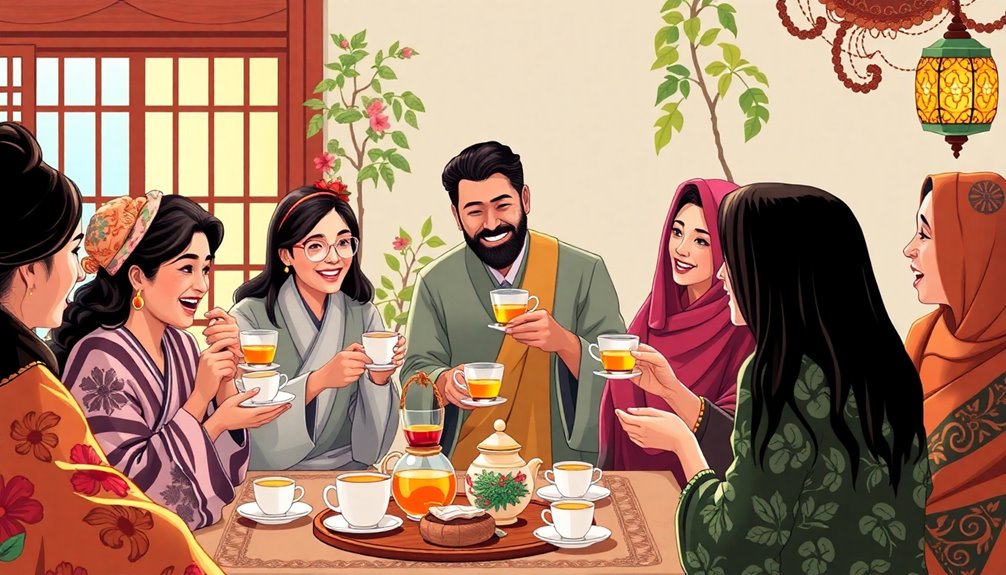
Across cultures, tea acts as a powerful social connector, bringing people together in meaningful ways. In India, sharing chai—a spicy, milky drink—is a daily ritual that fosters community and hospitality, whether in busy cities or quiet villages.
In Morocco, mint tea, traditionally served to guests, symbolizes friendship. The unique pouring technique not only enhances the flavor but also invites lively conversation.
The British afternoon tea tradition is another way tea is much more than just a drink. It's a cherished social event where friends and family gather to enjoy light snacks and strengthen their bonds.
In Japan, the tea ceremony, or Chanoyu, highlights the art of making matcha. This ritual promotes harmony and respect, offering a peaceful space for connection.
Chinese tea culture also emphasizes togetherness with practices like Yum Cha, where tea is enjoyed alongside delicious dim sum. These shared experiences allow people to engage in conversation and build relationships in a relaxed atmosphere.
Cultural Appropriation in Tea Practices

Navigating the complexities of cultural appropriation in tea practices requires a keen awareness of the traditions and meanings behind each brew. When you enjoy tea, it's important to recognize that many practices come from specific cultures with rich histories.
For example, the Japanese tea ceremony isn't just about sipping tea; it's a beautiful ritual filled with respect and intention.
Cultural appropriation happens when elements of these traditions are taken without understanding or acknowledgment. This can lead to misrepresentation and even commodification. As tea becomes popular worldwide, like bubble tea from Taiwan, it's easy to forget the original customs that inspired it.
To truly appreciate tea practices, you should educate yourself about their origins. For instance, Morocco's mint tea rituals and India's chai traditions have deep meanings that deserve respect.
By learning about these customs, you can celebrate tea without appropriating it. Encouraging mindful consumption is key. When you choose to honor the cultural significance of tea practices, you foster appreciation rather than appropriation.
Practical Applications
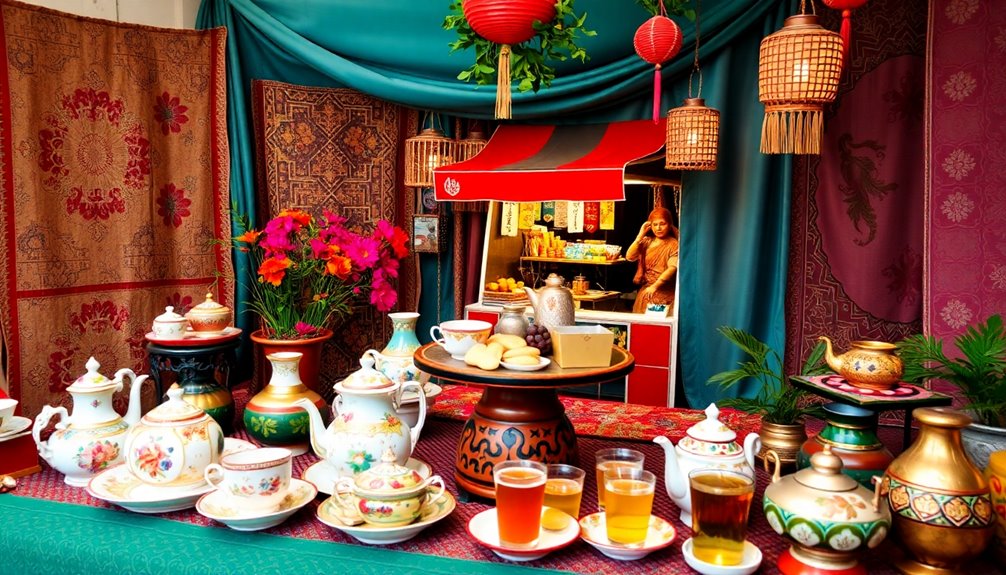
Embracing the rich traditions of tea can enhance your appreciation for this beloved beverage while fostering meaningful connections. You can easily incorporate these practices into your daily life.
For instance, consider hosting a mini Gongfu tea ceremony. Gather friends, brew high-quality green teas, and savor each infusion together. This mindful experience encourages conversation and laughter.
If you want to explore Japanese culture, why not prepare matcha using traditional Chado techniques? Invite friends over, and serve matcha with a few sweet treats. As you whisk the tea, discuss the beauty of the present moment.
For a cozy gathering, try making chai. Use Assam black tea, milk, and spices to create a unique blend. Share your chai with friends, and enjoy the regional flavors together.
You can also adopt the Moroccan mint tea ritual by preparing and serving tea with flair. Pour the tea from a height to aerate it, making it taste even better while inviting social interaction.
Lastly, don't forget about the British afternoon tea! Serve various tea drinks alongside light snacks, encouraging everyone to relax and enjoy each other's company.
Each of these traditions brings a special flavor to your tea experience!
Frequently Asked Questions
How Do Different Countries Say Tea?
You'll find that different countries have unique terms for tea. In China, it's "chá," in Japan "ocha," India uses "chai," Thailand also says "cha," and Russia calls it "chai" as well. Each carries cultural significance.
How Many Types of Tea Ceremony Are There?
There are countless types of tea ceremonies worldwide, each unique in its traditions and rituals. You'll discover everything from the meditative Japanese Chanoyu to the communal Chinese Yum Cha, showcasing diverse cultural approaches to tea.
Which Country Is Famous for Tea Ceremony?
When you think of renowned tea ceremonies, Japan stands out with its traditional Chanoyu. This ritual emphasizes harmony and respect, transforming tea drinking into a serene experience that celebrates simplicity and seasonal beauty.
What Are the Cultural Aspects of Tea?
Tea embodies cultural aspects like hospitality, mindfulness, and community. You'll find rituals that promote connection, such as sharing stories, appreciating craftsmanship, and enjoying flavors, all of which enrich your experience and deepen relationships.
Conclusion
In conclusion, tea isn't just a drink; it's a special part of many cultures around the world. From the elegant tea ceremonies in Japan to the lively chai gatherings in India, each country has its own unique way of enjoying tea. So, next time you sip your favorite brew, think about how it connects you to people everywhere. Embrace these traditions, share them with friends, and who knows? You might start your own tea celebration!

